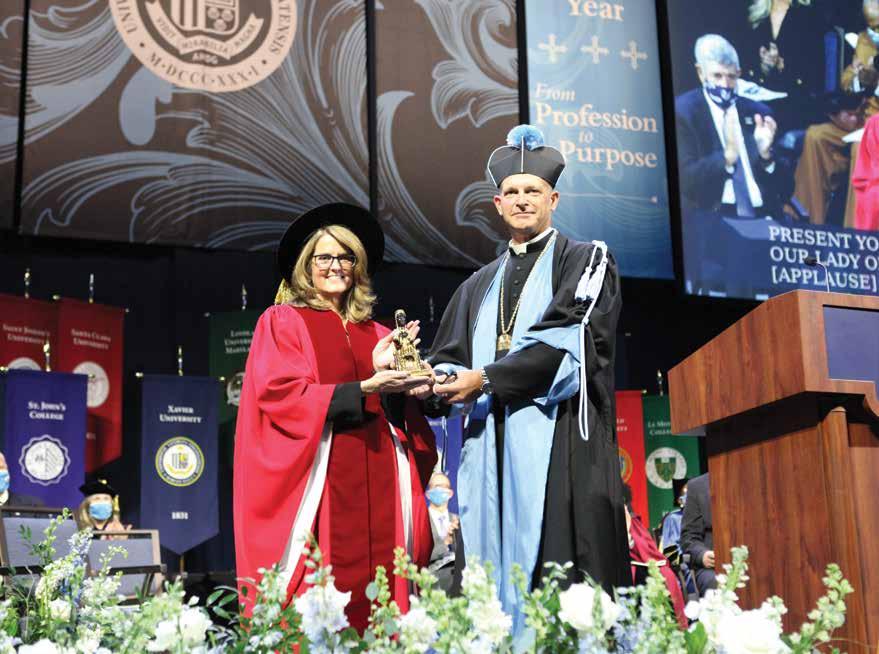
3 minute read
SEIZE THE MOMENT
SEIZE THE MOMENT HOPING AGAINST ALL HOPE
The Bible is full of passages on hope. Paul’s letters alone constantly return to this theme. This is expected since the Bible tells the story about the foundation of our hope – “Christ in you, the hope of glory” (Col. 1:27) – and Paul is the great Apostle of Hope.
Advertisement
While his relevant passages are too numerous to mention them all, here are three popular examples: “If we hope for what we do not see, we wait for it with patience.” (Rom. 8:25); “Since we have such a hope, we are very bold” (2 Cor. 3:12); “We who first hoped in Christ have been destined and appointed to live for the praise of his glory” (Eph. 1:12).
My favorite, though, comes from Paul’s account of Abraham’s life: “He believed, hoping against hope, that he would become ‘the father of many nations,’ according to what was said, ‘Thus shall your descendants be.’” (Rom. 4:18)
AGAINST ALL ODDS Abraham didn’t just hope, he hoped against hope. That’s a peculiar phrase, but it caught on and is now a popular idiom, such as, “I’m hoping against hope that I pass this test,” or “I’m hoping against hope that we find a cure for cancer.”
In common parlance, “hoping against hope” means never giving up, even when the odds are stacked against you or an expected outcome is decidedly unlikely. This certainly describes Abraham. He was 100-years-old and without children when God promised Abraham he would be the father of many nations. A sea of descendants for a centenarian? It doesn’t get more unlikely than that! And yet, Abraham persevered.
By hoping against hope, Abraham became a role model for all Christians. But, there’s still more to draw out of this interesting phrase. After all, how can hope be against hope? And how does that dichotomy somehow come to mean “believing in remote possibilities” or “facing insurmountable odds”?
HOPE VS. HOPE The only way to pit hope against hope is if there are two kinds of hope. There are, in fact, two kinds of hope in the Bible. One is the hope from Paul’s letters, the virtue that comes from and is rooted in Jesus. It is the humble expectation that, in Jesus, there are salvation, resurrection and victory over sin and death. But, there is also a worldly kind of hope, one that is not rooted in faith or in God, what the Bible calls “vain” or “uncertain” hope (see, for example, 2 Macc. 7:34; Ps. 33:17; 1 Tim. 6:17). Sometimes, we mistakenly cultivate it, too.
By hoping against hope, Abraham is setting the hope that comes from God’s promises above any hope he could have in the world. It’s interesting that, even at 100, this was not easy for him. By conceiving a son through his servant Hagar, his hopes became inverted. But God renewed His promises, and Abraham renewed his hope in them, until the day came when Sarah finally gave birth to Isaac.
As we see from Abraham’s example, it is only by setting hope against hope that we can expect the fulfillment of our deepest desires and persevere through life’s greatest challenges. Hope in anything else will only frustrate and disappoint us, if not outright destroy us.
THE NEXT ABRAHAM What is your hope rooted in? It’s easy to say that our hope is in Jesus, but is it really? Or is it rooted in money, health, political victory, career success or popularity? Ask Jesus to reveal the false hopes in your life and give you the strength to replace them with Him. That’s the only way that we, like Abraham, can hope against hope and see God’s mighty promises fulfilled.
NICHOLAS HARDESTY
is the associate director of Adult Evangelization and RCIA for the Center for the New Evangelization. nhardesty@catholicaoc.org.

The Very Reverend Anthony R. Brausch, President/Rector of The Athenaeum of Ohio/Mount St. Mary’s Seminary, presented Colleen Hanycz, PhD, with a statue of Our Lady of Montserrat. Nearly 500 years ago, St. Ignatius, the founder of the Jesuits, laid down his sword at her feet and turned from being a soldier of war to being a soldier for Christ. Fr. Brausch stated, “In this Ignatian Year, as you see all things new in Christ, may your Catholic faith be strengthened, and may your faith be an inspiration to all whom you meet.” On October 28, Dr. Hanycz was installed as the 35th President of Xavier University, the 6th oldest Catholic university in the country and nationally recognized by U.S. News & World Report.










